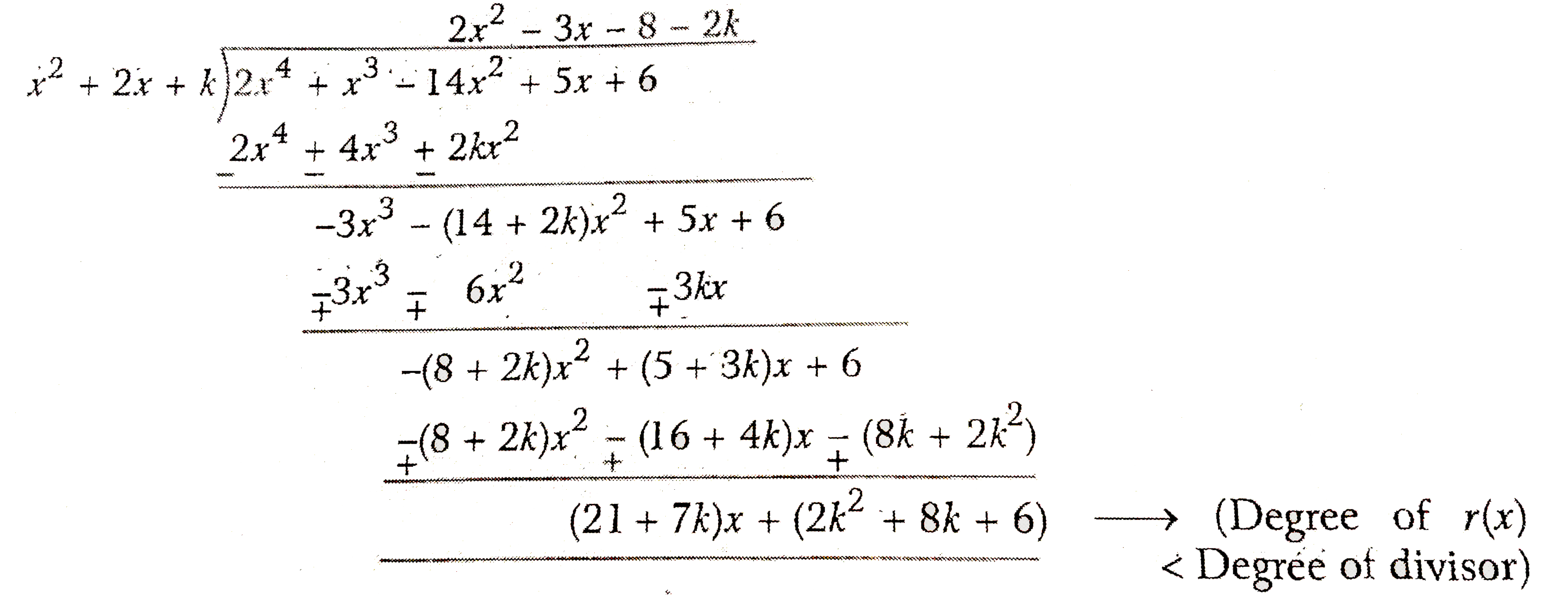Saved Bookmarks
| 1. |
Find k so that x^(2)+2x+k is a factor of 2x^(4)+x^(3)-14x^(2)+5x6. Also find all zeroes of two polynomials. |
|
Answer» <P> and `"" g(x)=x^(2)+2x+k`  But remainder =0 `IMPLIES""(21+7k)x+(2k^(2)+8k+6)=0` `implies ""21+7k=0 ""and ""2k^(2)+8k+=0` `implies "" 7k=-21 "" and "" k^(2)+4k+3=0` `implies "" k=-3"" and ""(k+3)(k+1)=0` `implies "" k=-3 ""and ""k=-3 or k=-1` `:. "" k=-3` Now, `q(x)=2x^(2)-3x-8-2k=2x^(2)-3x-8+6=2x^(2)-3x-2` `=2x^(2)-4x+x-2=2x(x-2)+1(x-2)=(x-2)(2x+1)` Its zeroes are given by x-2=0 and 2x+1=0 `implies ""x=2 andx=-(1)/(2)` and `"" g(x)=x^(2)+2x+k=x^(2)+2x-3=x^(2)+3x-x-3` `=x(x+3)-1(x+3)=(x+3)(x-1)` Its zeroes are given by x+3=0 and x-1=0 `implies"" `x=-3 and x=1 `:.` Zeroes of g(x) are-3and 1 and zeroes of p(x) are -3, 1, 2 and `-(1)/(2) ""` Ans. |
|
Discussion
No Comment Found
Related InterviewSolutions
- Find the sum of a] first 10 multiples of 8 b] first 25 multiples of 3 c] first 100 multiples of 2.
- Which of the following figures correctly represents the relation between:Doctors,Lawyers.Professionals?
- A solid metalli sphere of radius 6 cm is melted and made into a solid cylinder of height 32 cm. Find the : (i) radius of the cylinder (ii) curved surface area of the cylinder. (Take pi=3.1)
- Solve the following simultaneous equations : x/3 + y/4 = 2 , 3x + 4y = 25
- Construct a triangle similar to a given triangle ABC with its sides equal to (6)/(5) of the corresponding sides of the triangle ABC (scale factor (6)/(4)).
- A man has a choice to invest in hundread rupee shares of two firms at 120rs or at 132rs. The first firm pays a dividend of 5% per annum and the second firm pays a dividend of 6% per annum. Find : (i) which company is giving a better return. (ii) if a man invests 26400rs with each firm how much will be the difference between the annual returns from the two firms ?
- 10 students of Class-X took part in a mathematics quiz. If the number of girls in 4 more than the number of boys then, find the number of boys and the number of girls who took part in the quiz.\
- Number of distinct line segments that can be formed out of n- points is…
- Find the sum of the following Aps: (i) 2, 7, 12, …….., to 10 terms. (ii) -37, -33, -29, …….., to 12 terms. (iii) 0.6, 1.7, 2.8,….., to 100 terms (iv) (1)/(15), (1)/(12),(1)/(10),……,to 11 terms
- Write the following sets in the set-builder form (i) {3,6,9,12} (ii) {2,4,8,16,32} (iii) {5,25,125,625} (iv) {1,4,9,16,25,....,100}